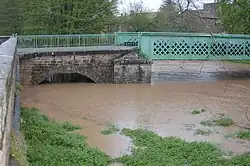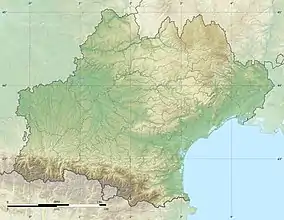| Cérou | |
|---|---|
 | |
  | |
| Location | |
| Country | France |
| Physical characteristics | |
| Source | |
| • location | near Saint-Jean-Delnous |
| • coordinates | 44°03′21″N 02°28′33″E / 44.05583°N 2.47583°E |
| • elevation | 530 m (1,740 ft) |
| Mouth | |
• location | Aveyron |
• coordinates | 44°08′21″N 01°52′32″E / 44.13917°N 1.87556°E |
• elevation | 128 m (420 ft) |
| Length | 87.1 km (54.1 mi) |
| Basin size | 503 km2 (194 sq mi) |
| Discharge | |
| • average | 4.13 m3/s (146 cu ft/s) |
| Basin features | |
| Progression | Aveyron→ Tarn→ Garonne→ Gironde estuary→ Atlantic Ocean |
The Cérou (French: le Cérou) is an 87.1 km (54.1 mi) long river in the Aveyron and Tarn departments in southern France.[1] Its source is at Saint-Jean-Delnous, 1.8 km (1.1 mi) northwest of the village. It flows generally west-northwest. It is a left tributary of the Aveyron, into which it flows at Milhars, 1.4 km (0.87 mi) north of the village.
Departments and communes along its course
It flows generally west through the following departments and communes, ordered from source to mouth:
- Aveyron: Saint-Jean-Delnous, Lédergues
- Tarn: Lédas-et-Penthiès, Lacapelle-Pinet, Padiès, Crespin, Andouque, Saint-Jean-de-Marcel, Valderiès, Rosières, Carmaux, Saint-Benoît-de-Carmaux, Monestiés, Le Ségur, Salles, Saint-Marcel-Campes, Cordes-sur-Ciel, Les Cabannes, Mouzieys-Panens, Vindrac-Alayrac, Labarthe-Bleys, Marnaves, Milhars
Tributaries
The Farruel (12.5 km), the Boutescure (15.4 km), the Céroc (17.6 km), the Candou, the Céret (28.5 km), the Zère, the Aymer (12,2 km), and the Bonnan.
References
This article is issued from Wikipedia. The text is licensed under Creative Commons - Attribution - Sharealike. Additional terms may apply for the media files.